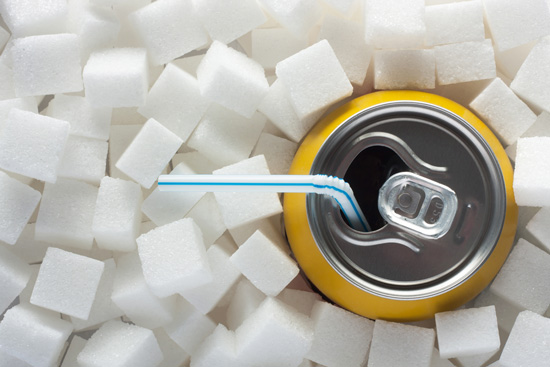About The Buzz: Replacing Even One Sugary Drink a Day Offers Health Benefits?

WHAT THEY’RE SAYING
Skipping one sugar-sweetened beverage a day – an energy drink, a soda, a sweetened iced tea, etc. – can help Americans lead healthier lifestyles and reduce obesity. Individuals looking to reduce their daily energy intake (total calories a day) to lose weight or maintain a healthy weight can do so by reducing and limiting their intake of sugar-sweetened beverages.
WHY THIS MATTERS
Consuming sugar-sweetened beverages (SSB) can very easily lead to consuming too many calories over the course of a day. Consider how much sugar a single can of soda contains: a standard, 12-ounce soda contains 140 calories and 39 grams of sugar. To put this in perspective, 39 grams of sugar is nearly 8 teaspoons of sugar. By consuming soda or other SSBs during mealtimes, it’s very easy to see how an individual could consume more calories than intended during a meal.
Adequate hydration through water consumption is linked with numerous beneficial health outcomes, including maintaining peak physical and cognitive performance, weight management, and weight gain prevention and improving metabolic rate. Consuming SSB is associated with various negative health outcomes, such as increased body weight, risk of obesity, type 2 diabetes, cardiovascular disease and unhealthy eating patterns. There is no formal Recommended Dietary Allowance (RDA) for total water intake, but the Institute of Medicine’s Food and Nutrition Board suggests adult men and non-pregnant, non-lactating women over 19 years consume 3.7 L (125 fluid ounces) and 2.7 L (91 fluid ounces) each day, respectively.
THE DIETARY GUIDELINES
A very important focus of the 2015 Dietary Guidelines for Americans was on Americans’ SSB consumption. Many years of research have connected SSB consumption with unhealthy weight and health outcomes, and to address the issue a specific guideline regarding beverage intake was created. To help Americans shift to healthier food and beverage choices, the 2015 guidelines recommend that Americans reduce added sugar consumption to less than 10 percent of calories per day. Additionally, the guidelines state that when choosing beverages, the “calorie and nutrient contribution to the diet should be considered.”
RECENT STUDY
Recently, a study published in the research journal Nutrients evaluated the impact of swapping one serving of SSB with water. The nationally representative group of participants included a total of 16,429 Americans, ages 19 and older from the 2007–2012 National Health and Nutrition Examination Survey (NHANES).
RESULTS OF THE STUDY
This study showed that the young adults (ages 19-29) consumed the greatest amount of water daily, at 41oz./day, and older adults (ages 66+) consumed the least amount of water daily, at 26 oz./day. Overall, younger and middle aged adults (aged 19–49) consume the largest absolute number and the largest proportion of their calories from beverages, at 21% of their total caloric intake coming from beverages. On average, 41.8% of young adults consume ≥2 servings of SSB, higher than any other age group. Amongst middle aged adults (30-49 years), 32.7% consume ≥2 servings of SSB a day; those in the older age groups (50-65 years and 66+) are the least likely to consume ≥2 servings of SSB daily, at 18.9% and 8.5%, respectively.
This study shows that too many Americans are overdoing it on sugar-sweetened beverages each day. While this finding is alarming due to the negative health outcomes of excessive SBB consumption, this study also showed that by replacing one 8 oz. SSB serving with one 8 oz. serving of water, there is a considerable decrease in total energy from beverages and percent of calories from beverages across all age groups. Among adults who consumed just one SSB serving daily, swapping that one SSB serving with water resulted in a 33% decrease in total energy and a decrease in the percent of energy from beverages, lowering it to an acceptable range of 10%–14%.
OUR ADVICE
These findings have dramatic implications for anyone looking to lose weight or maintain a healthy weight. In order to lose weight, a caloric deficit must be created. In other words, the calories you burn must be greater than the calories you eat. To lose one (1) pound, you must burn 3,500 calories. If you drink even 1 can of soda every day, that means you’re consuming an extra 51,100 calories a year (140 calories x 365 days), which is equivalent to 14.6 pounds of weight gain a year from soda alone. Replacing sugar-sweetened beverages with water is a great strategy to reduce calorie intake.
Not crazy about the taste of plain water? To add some variety and flavor to your water, check out our delicious, naturally sweet fruit infused water ideas. Also remember, 100% juice does not contain added sugar and is not a sugar-sweetened beverage. Include 6-12 ounces daily of 100% fruit juice as one beverage choice that also boosts nutrition.2
Video Center: Selection. Storage. Preparation.
How Many Cups Do You Need?
Key Nutrients in Fruits & Vegetables
Fruit & Veggie Database


